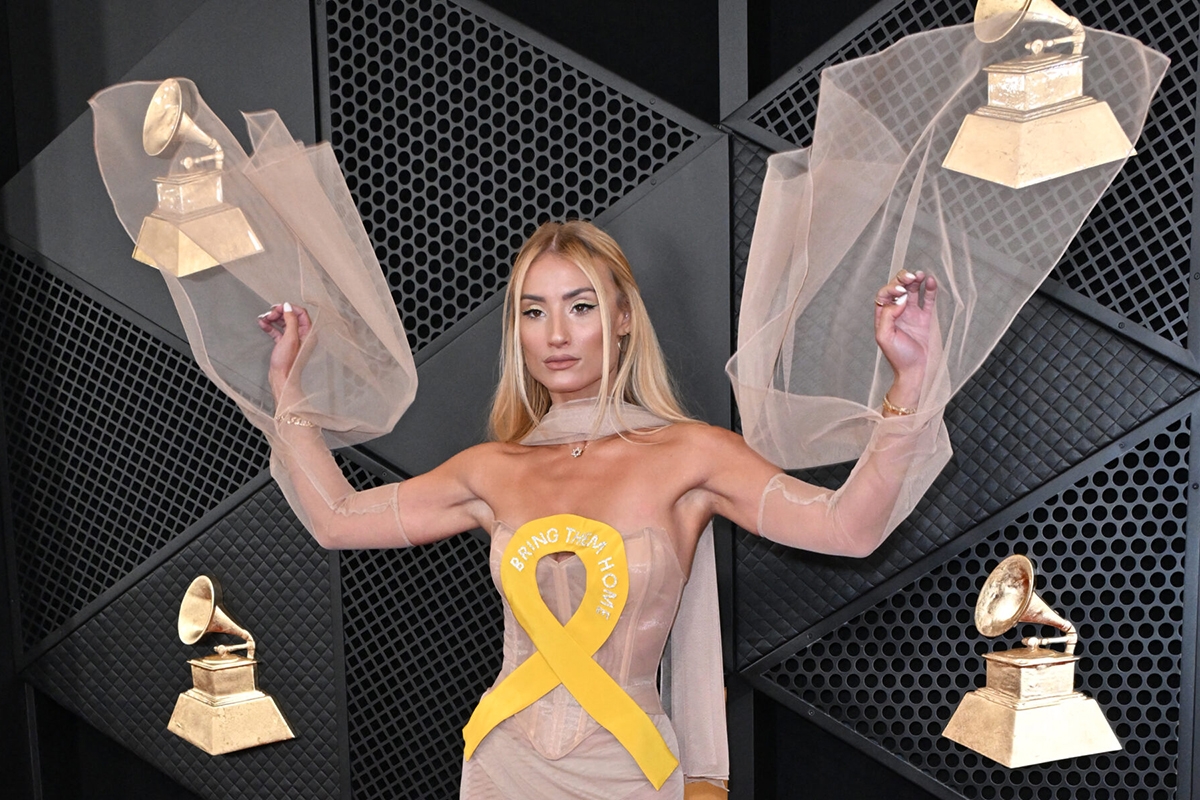The biggest Jewish winner of the Grammys officially was producer Jack Antonoff, who walked out of the event with a best producer of the year award for his collaboration with Taylor Swift and Lana Del Rey.
And yet the war in Gaza, and the reverberations of the October 7 attack in Israel, had an even bigger impact on the music awards show celebrating its 66th year last night.
On the red carpet and at subsequent events, Israeli and Jewish artists wore reminders of the hostages held in Gaza. At a Grammy afterparty, Israeli singer Mergui wore a yellow ribbon representing the hostages, after acknowledging criticism from fans who were angry that he didn’t wear the insignia at a Spotify afterparty.
Israeli music producer Johnny Goldstein, who produced the song “Baby Don’t Hurt Me” by Anne-Marie, Coi Leray and David Guetta (which incorporates the classic Haddaway song made iconic by the movie “Night at the Roxbury”) also wore a yellow ribbon on the red carpet. As did singer Ben-El Tavori, who attended the event with his girlfriend, stylist Danielle Levi, who works for Kim Kardashian.
Jewish influencer Montana Tucker, who visited Israel earlier this year after the October 7 attacks, made the biggest statement with a nude colored dress that was adorned by a gigantic yellow ribbon that read “Bring Them Home.” The dress was designed by the fashion brand MadeByILA, started by Israeli designer Ortal Mizrahi.
Jewish Grammy winner Joanie Leeds, who won an award in 2021 for best children’s music album for her feminist album “All the Ladies,” came to the event with a red dress by Israeli designer Karen Sabag and held a custom clutch from Rae of Light made out of white mother of pearls with the hashtag #BringThemHome on it. Leeds told Kveller she was very intentional about her outfit, making sure that everything was created by Jewish and Israeli designers.
While a protest for a ceasefire was held outside the Crypto.com Arena in Los Angeles despite the pouring rain, with activists reportedly trying to block and disrupt attendees from going into the event, their cry for a ceasefire was echoed on both the red carpet — with one of the big winners of the night, Boygenius, wearing their Artists for Ceasefire pins — and the stage during the in memoriam tribute. A tearful Annie Lennox, of Eurythmics fame, sang “Nothing Compares 2 U” by fellow Irish compatriot Sinead O’Connor, who passed away last year, and accompanied the song with a cry of “artists for ceasefire” and “peace in the world!”
The rallying cry seemed appropriate in an ode for O’Connor, who was no stranger to making political statements on stage (in fact, she did subtly so at her first stateside performance at the 1989 Grammys). It was also admired by Lennox’s daughter, Tali, who shared a clip of the moment on her Instagram stories with the caption “bringing the message to the Grammys,” tagging her mother and adding an icon of a dove. Her younger daughter, Lola, who was at the Grammys, shared a post from Matt Bernstein lauding the gesture as well. Both of Lennox’s daughters are half-Israeli; their father is Israeli activist and producer Uri Fruchtman, who has shied from the spotlight despite being married to Lennox between 1988 and 2000. The girls were raised in London, though they have family in Israel. After October 7, Lola posted thoughts on her Instagram, writing that “every civilian life lost should be treated with equal compassion, empathy and grief,” and decrying those who undermine or celebrated “atrocities faced by civilians on one side vs the other.”
On stage at the Grammys, music producer and the CEO of the Recording Academy, Harvey Mason Jr., also harped on the need to find connection and humanity for all when he paid tribute to the lives lost during the Nova Music Festival on October 7.
As he walked on stage to moving instrumental music, Mason first praised the international nature of the event and the many countries of origin represented that night, and then talked about music as a great connector. “Every one of us, no matter where we are, is united by the shared experience of music. It unites us like nothing else and that’s why music must be our safe space. When that’s violated, it strikes at the very core of who we are.”
“We felt that at the Bataclan concert hall in Paris,” he continued, beginning to list off various attacks that have occured during music performances. “We felt that at the Manchester Arena in England. We felt that at the Route 91 Harvest Music Festival in Las Vegas. And, on October 7, we felt that again, when we heard the tragic news from the Supernova Music Festival for Love, that over 360 music fans lost their lives and another 40 were kidnapped.”
“That day and all the tragic days that have followed have been awful for the world to bear as we mourn the loss of all innocent lives,” he said.
“We live in a world divided by so much. And maybe music can’t solve everything, but let us all agree, music must remain the common ground upon which we all stand, together in peace and harmony. Because music has always been one of humanity’s greatest connectors.”
Mason then drew attention to the four musicians playing as he said, “Take this string quartet — as individuals, they sound really good, but together they achieve something beautiful they could never do apart. These musician of Palestinian, Israeli and Arab descent are here, playing together. Now is time for us, for humanity, to play together, to come together, with empathy, and with love,” he urged the viewers and the crowd.








